

Operant conditioning. Operant Conditioning. How Reinforcement and Punishment Modify Behavior Operant conditioning, also known as instrumental conditioning, is a method of learning normally attributed to B.F. Skinner, where the consequences of a response determine the probability of it being repeated. Through operant conditioning behavior which is reinforced (rewarded) will likely be repeated, and behavior which is punished will occur less frequently.
By the 1920s, John B. Watson had left academic psychology, and other behaviorists were becoming influential, proposing new forms of learning other than classical conditioning. Skinner's views were slightly less extreme than those of Watson (1913). The work of Skinner was rooted in a view that classical conditioning was far too simplistic to be a complete explanation of complex human behavior. Reinforcement. Positive and Negative reinforcement. Continuous or partial reinforcement. Punishment.
Positive and Negative Punishment. (Video to aid understanding) Skinner’s Operant Conditioning: Rewards & Punishments. (Video to aid understanding) How to Train a Brain - Crash Course Psychology #11. Operant Conditioning in Disney Movies. (Positive Punishment and Negative reinforcement examples) 12 Examples of Positive Punishment & Negative Reinforcement. You might be thinking that “positive punishment” sounds like an oxymoron, after all, how can punishment be positive?
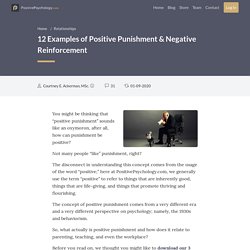
Not many people “like” punishment, right? The disconnect in understanding this concept comes from the usage of the word “positive;” here at PositivePsychology.com, we generally use the term “positive” to refer to things that are inherently good, things that are life-giving, and things that promote thriving and flourishing. (Positive Reinforcement examples) Positive Reinforcement in Psychology (Definition + 5 Examples) If you read our earlier piece on positive punishment, you know that there are different methods of teaching and instilling good habits and behaviors.
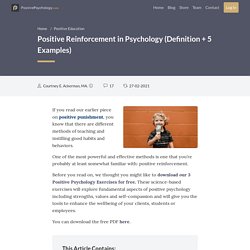
One of the most powerful and effective methods is one that you’re probably at least somewhat familiar with: positive reinforcement. Before you read on, we thought you might like to download our 3 Positive Psychology Exercises for free. These science-based exercises will explore fundamental aspects of positive psychology including strengths, values and self-compassion and will give you the tools to enhance the wellbeing of your clients, students or employees.
You can download the free PDF here. What is the Meaning of Positive Reinforcement? Positive reinforcement refers to the introduction of a desirable or pleasant stimulus after a behavior. (Negative Punishment examples) Negative Punishment Examples and Scenarios. Nobody ever wants their stuff taken away.
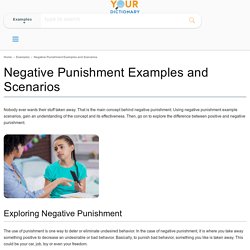
That is the main concept behind negative punishment. Using negative punishment example scenarios, gain an understanding of the concept and its effectiveness. Then, go on to explore the difference between positive and negative punishment. Exploring Negative Punishment The use of punishment is one way to deter or eliminate undesired behavior. When thinking of negative punishment, you might think of B.F. Summary on Operant Conditioning.
The Difference Between Positive/Negative Reinforcement and Positive/Negative Punishment [with Examples] Reinforcement and punishment are often used as parenting tools to modify children’s behavior.
![The Difference Between Positive/Negative Reinforcement and Positive/Negative Punishment [with Examples]](http://cdn.pearltrees.com/s/pic/th/reinforcement-punishment-183049524)
Let’s review the difference between positive reinforcement and negative reinforcement, and the difference in outcomes between them. The Difference Between Positive And Negative Reinforcement In behavioral psychology, reinforcement is the introduction of a favorable condition that will make the desired behavior more likely to happen, continue or strengthen in the future1. Because the favorable condition acts as a reward, reinforcement is a reward-based operant conditioning.
Difference Between Negative Reinforcement And Punishment - Evolution Counseling. Behavioral Psychology By Michael Schreiner | March 20, 2015 A question that always pops up in behavioral psychology is what the difference is between negative reinforcement and punishment.

The confusion is understandable because both forms of control have aversive stimuli embedded within them, in other words something that the organism wants to avoid. Where they differ then is in their consequences. Punishment tries to make the behavior being punished stop, whereas negative reinforcement tries to make the behavior being negatively reinforced occur more often. We are negatively reinforced by all kinds of things that end up leading to good consequences actually. Difference in Negative Reinforcement and Punishment. Positive reinforcement. Negative reinforcement. Positive and Negative punishments. (Positive reinforcement) Motorists get pulled over - for doing good.
When Mr Lim Kan Seng's Toyota Previa was pulled over by the Traffic Police along New Upper Changi Road yesterday morning, he panicked a little. Mr Lim, 50, a hawker, thought he might be in for a summons, but what he received instead were a zebra plush toy and $40 worth of petrol vouchers. "I thought I had done something wrong... but the police said they saw me giving way to another driver, and wanted to commend me," he said. "I had just turned left into the main road when another car was trying to cut into my lane from the right, so I let him pass. " Mr Lim was among seven motorists who were pulled over on the roads yesterday for displaying good driving habits, as part of a nine-hour island-wide "Spot the Conscientious Motorists" operation conducted by the police. Since the programme started in October 2013, 391 motorists have been identified and rewarded.
Motorists get a commendation certificate, in addition to the road safety mascot toy and vouchers. adrianl@sph.com.sg. (Positive reinforcement) Driver gets award for helping elderly wheelchair user who was struggling to cross road in the rain, Singapore News. SINGAPORE - A split-second decision on the road has seen Mr David Chin, 41, become the subject of a viral online video as well as the recipient of the Public Spiritedness Award on Friday (Sept 25). Recounting the incident, Mr Chin said that he was driving home in pouring rain after picking up his 11-year-old daughter from ballet class on Sept 5. At a traffic junction, he saw an old man on a wheelchair struggling to cross the road. The green light for pedestrians at the crossing were already flashing but the man, who looked about 70, had barely made it half way across. He had an umbrella over his shoulder, which impeded his manoeuvring of the wheelchair. "He could not move.
He pushed the man to safety before returning to his car and did not think twice about the incident. Unknown to him, though, his act was captured on video. (Positive Reinforcement) Road Safety Campaigns. RoadSense Carnival On 6 July 2019, Traffic Police organised the RoadSense Carnival at the Ngee Ann City Civic Plaza.

The inaugural RoadSense Carnival was graced by Mr Amrin Amin, Senior Parliamentary Secretary for Ministry of Home Affairs & Ministry of Health. The event’s theme was ‘Take the Road to Responsibility’, and this event was organised to educate road users in Singapore about the importance of graciousness to create a more pleasant road user experience for all Singaporeans. More than 3,600 people attended the event to learn about road safety through a line-up of fun and engaging games and activities. Traffic Police also launched eight characters, known as “The Responsibles”, to reinforce the need for a shared and collective sense of responsibility for our actions on the roads in Singapore.
Singapore Ride Safe Campaign 2019. (Positive Reinforcement) Road Safety Events. (Negative Reinforcement) Police officer fined S$200, 12 demerit points for beating red light Read more at. SINGAPORE — A police officer has been fined $200 and given 12 demerit points for beating a red light last month.

In a video recorded by an in-car camera on June 4 and posted online, a police car is seen driving through a red traffic signal at a T-junction at Bukit Batok West Avenue 5 and Bukit Batok Street 31. (Negative Reinforcement) Keeping people safe on India’s killer roads. In 2015, India adopted The Brasilia Declaration, committing to cut down deaths by road accidents by half by 2020.

However, the number of deaths has actually increased, though marginally, from 1,48,707 in 2015 to 1,54,732 in 2020. Despite several measures being taken to realise the goal, why have Indian roads continued to be death traps? The causes of road accidents are several and often, it is the result of an interplay of various factors like human error, road environment and vehicular condition. (Punishment) Raise the cost of reckless behaviour on UAE roads. A spate of road crashes involving fatalities and serious injuries has raised concerns on driver behaviour and speeding in the UAE.
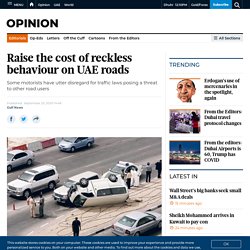
The most recent example of reckless behaviour is from Umm Al Quwain where a motorist, driving on the wrong side of Sheikh Mohammed Bin Zayed Road, rammed his vehicle into another car coming from the opposite direction. Three people, including two Emiratis and the motorists, died on the spot on Sunday. The driver was drunk and was speeding. Two days later, two buses collided in Abu Dhabi, killing three Asian expats and injuring two others. Police said the driver of one bus was not paying attention when the crash happened on Saih Shuaib Road. (Positive Punishment) Over 560 motorists fined in first half of 2014 for their failure to signal, Transport News.
You see it all the time on the road - drivers turning or changing lane without signalling their intention to do so. But according to traffic rules, the failure to signal is an offence. The Traffic Police said 564 summonses were issued for this in the first six months of this year - the highest in three years. The penalty, according to the Traffic Police, is a $70 fine for light vehicles and a $100 fine for heavy ones.
But many motorists told The Straits Times that they did not know they could be fined for turning without signalling. Retiree Thomas Wee said: "I didn't know that. (Negative Punishment) NTU associate professor jailed and banned from driving for colliding into motorcyclist while making discretionary right turn. SINGAPORE: A Nanyang Technological University (NTU) associate professor drove without a proper lookout and made a discretionary right turn into a motorcyclist, who suffered multiple fractures.
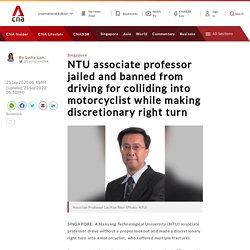
For one count of a negligent act causing grievous hurt, 61-year-old Lau Kim Teen was jailed for five days and banned from driving for two years on Thursday (Sep 24). The court heard that Lau, a Malaysian and Singapore permanent resident, had driven to an eatery near Pioneer Road for dinner on Dec 30, 2018. He drank beer during his meal, and left at about 8.45pm, driving along Jurong West Street 93.
At the T-junction between Jurong West Street 93 and 92, he intended to make a right turn. Brief explanation on the articles. Concluding.